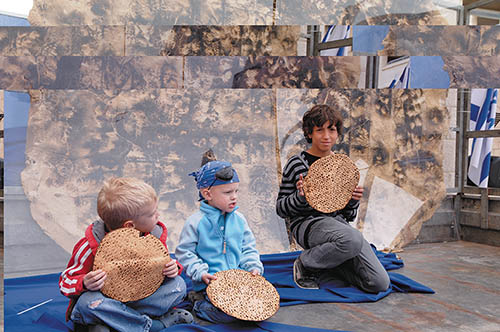


The Passover holiday brings with it a sense of cultural pride and an opportunity to rejoice with family. During this annual celebration, the Jewish nation unites to commemorate liberation from slavery in Egypt, to mark the gift of freedom in the Land of Israel, and to pay tribute to a glorious heritage.
But for the thousands of modern-day Israelis who are held captive by the shackles of poverty and hunger, there’s no real cause for celebration or joy.
Shocking statistics recently released in the Israel National Insurance Institute’s annual poverty report are painfully disheartening: a staggering 1.7 million Israelis, including almost 800,000 children, live below the poverty line. Too many families—parents and their children—are living in constant hunger, fear and pain.
As Israel’s premier food and social services organization, Meir Panim actively fights the poverty and hunger crisis in Israel every day.
Meir Panim’s programs offer lifesaving aid to the poorest members of Israeli society. A wide network of relief centers across the country supply ongoing crucial services to families who have nowhere else to turn.
Meir Panim combats poverty not just during holidays but also year round, through extensive food distribution networks and a bevy of social service programs for both adults and children. A comprehensive coalition of relief centers strategically situated across the Jewish homeland supply lifesaving nourishment and critical services to poor Israelis who live day-to-day, trying to remain afloat in a sea of despair.
Services provided include: food relief centers serving 410,000 meals annually in restaurant-style soup kitchens; Meals on Wheels delivering 180,000 meals annually to the homebound, disabled, and elderly; Meals for Children distributing 100,000 hot, nourishing lunches annually to children; food shopping cards issued annually to 5,300 families to buy food at grocery stores; and the Israel Nutrition Center, the only food production and distribution facility in the Middle East capable of serving 30,000 meals each day.
These services are regularly hailed as being comprehensive and inclusive. But when Passover arrives, Meir Panim’s bustling operations kick into overdrive.
In addition to distributing hundreds of boxes filled with matzah, fish, chicken, vegetables and other Passover essentials, Meir Panim oversees multiple auxiliary programs—such as the popular Kulam Beseder initiative.
“We want to ensure that needy people, particularly the elderly without family, do not spend Passover alone,” explains David Roth, president of Meir Panim. “So we match people with host families for Passover seders. In 2015, more than 2,300 individuals were placed, and that number is rising for this year.”
But the Kulam Beseder initiative is just one component in the grand scheme of things.
Hundreds of people will participate in meaningful seders, being held in Meir Panim’s Dimona and Haifa restaurants, and join one another in unity to celebrate their Jewish heritage.
For struggling families wishing to celebrate the holiday in their own homes, Meir Panim is distributing a number of pre-paid food shopping cards, enabling recipients to purchase Passover necessities to fill their refrigerators and pantries.
The Meir Panim Or Akiva after-school club will be keeping its doors open throughout the almost-three-week-long Passover break, offering daily nutritious meals, continued educational and social enrichment, and special outings such as a boat ride on the Kinneret.
And the critical services offered by Meir Panim don’t stop once the Passover holiday comes to a close.
Tens of thousands of families—many who have been affected by the drastic cuts in Israel’s social services funding and have watched helplessly as their already precarious financial situations plummeted in response—rely solely on Meir Panim for basic sustenance throughout the year.
“These needy people are essentially left to fend for themselves and are struggling to survive each day,” says Roth. “We need the Jewish communities of America to unite and help these underprivileged Israelis experience true freedom—from poverty, from darkness and from hunger.”
By Danielle Ross










